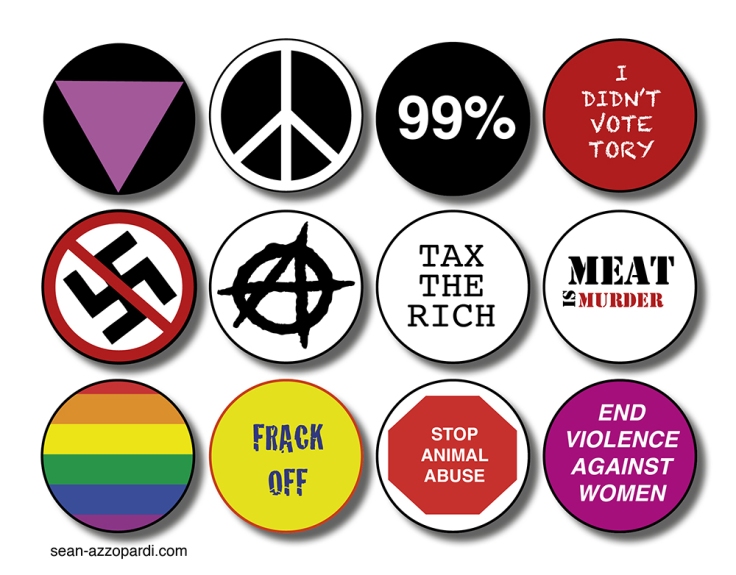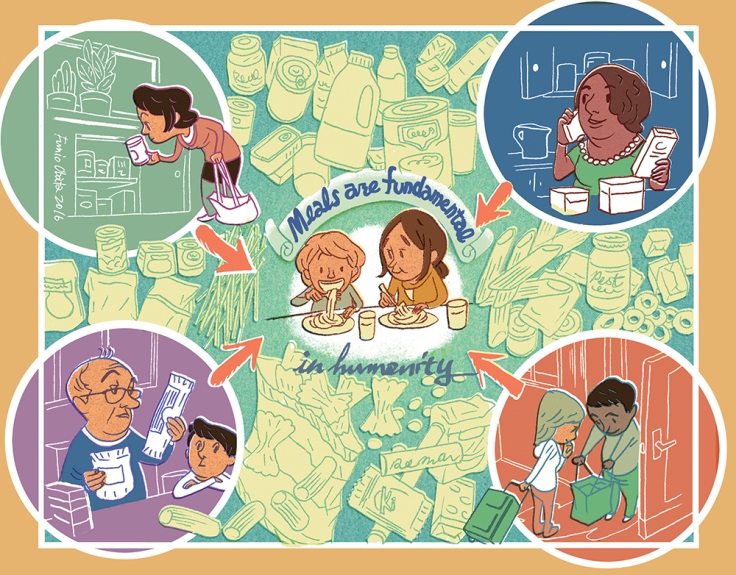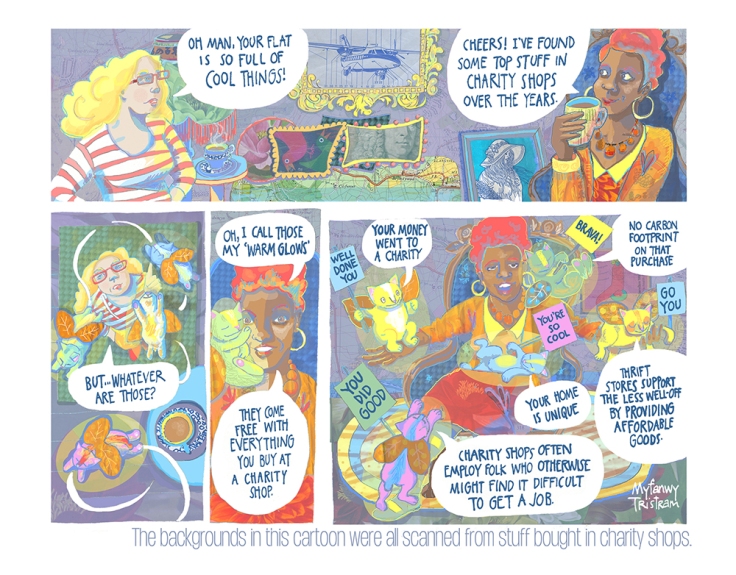Do your kids want to change the world?
There’s plenty they can do: so much so that we divided this post into three parts. Here’s the second chunk.
Click any of the images to see them at a larger size.

PIN A BADGE ON
This tiny action takes your beliefs out into the world, and shows people you’re ready to discuss them. Badges on the lapel? That’s fashion forward, too!
Image by Sean Azzopardi

REFUSE TO SHUT UP
If you’ve been angry six times this week, the next outrage might just start to feel a bit samey – but we’ve got to keep shouting.
You might lose a few Twitter followers, friends might begin to yawn… some things are more important.
Image by Richard Tingley

SPEND WISELY
Read up on the places where you spend your money: do they pay their workers a living wage? Do they support sweatshops or child labour? Do they fund the weapons industry or finance a political party that you disagree with?
Many apps and websites can help you. Shopping with local independent businesses can also help you avoid many of the big, bad brands.
Image by Emmi Bat

SIGN, SEAL, DELIVER
Signing a petition is so easy that it sometimes feels like it can’t be changing anything, but there are many examples of petitions that have reversed policy, halted poor decisions and changed the world.
In the UK, if a petition to Parliament gains more than 10,000 signatures, it must be considered for debate in the House. There is a similar law in Australia.
Once you’ve signed, share: your social circles are influenced by what you do, and sharing can bring in several more signatures.
Image by Nicholas Sputnik Miller

PLANT A TREE
The Woodland Trust gives eight reasons for planting a tree, from providing a habitat for the many creatures that live on, below and around them, to helping with flood defences.
In the UK, they’ll even provide trees for schools and communities, for free.
Image by Abigail Lingford

THROW A HASHTAG OUT THERE
Social media campaigns can be a hugely effective way to get the word out to the masses.
Take inspiration from Movember or the Ice Bucket Challenge. If you need to bone up, there are many many advice guides available online.
Image by Zoe N. Sugg

SPEAK UP AGAINST BULLYING
If you see someone being bullied, online, at work, at school, at home or in public, stand by the victim.
And speak up: report it to your boss, your teachers, the police. If they’re the people doing the bullying, go public. You owe it to everyone.
Image by César Lador

SAY IT OUT LOUD
When the political narrative directly turns against your beliefs, your race, your sexuality or your lifestyle, it’s frightening.
Do you know someone who may be reading the news and feeling that fear right now? Let them know you’ve got their back. You’d be surprised how much a few words can do.
Image by Josie Pearse

START A COLLECTION
Consult the websites of migrant aid charities and food banks to see what kind of food is needed — usually dried or tinned goods.
Then ask your neighbours to help you collect them. Allocating one type of food to each street in your neighbourhood can be good — and then the competitive instinct kicks in as you see which street can come up with the most.
Image by Fumio Obata

SEND A LETTER
Asylum seekers in detention will welcome your letters.
Image by Sha Nazir

SMILE, DON’T STARE
If you see someone who looks a little different for whatever reason, don’t stare. Just like anyone else, they have feelings too.
The difference between them and you? This might the first time you’ve been in this situation; for them, it’s a constant reality.
One of our artists says, “I’m a wheelchair user and get stared at a lot, but those that just nod, smile and acknowledge me, make my day”. He suggests, “See the person not the difference”.
Image by Mirka Oinonen

BE AN INTROVERT
If you can’t find it in yourself to go out and protest, there’s a simple way to help: by supporting your louder friends who can.
Cheer them on, cook them food, help them make signs — whatever you can manage.
Image by Beth Zyglowicz

CHALLENGE HATEFUL VIEWS
Online or face-to-face: don’t let it pass, say something.
Image by Al Davison

ESCHEW THE NEW
Buy second hand. You’ll be benefiting a charity if it’s from a thrift store, or helping out the seller if you buy direct.
Either way, you’ll be circumventing big business and shrinking your carbon footprint.
Image by Myfanwy Tristram

GO REUSABLE
Convenience be hanged, every disposable razor, pen, coffee cup or carrier bag we buy is wasting resources, magnifying our carbon footprint, and going straight to landfill — not to mention the horrible chemicals that were probably involved in its making.
We’re all used to the canvas tote bag now — it’s time to research permanent, reusable alternatives for the other wasteful goods in our lives.
Image by Daniel Locke

SHOUT TO THE STREET
Use your window as a political billboard.
Share your beliefs with the postman, visitors, and passers-by.
Many organisations, charities and causes offer posters that you can request by mail or print out directly from their websites.
Image by Joanna Neary
See more actions kids can take >>>
 All artwork on this page is licensed under a Creative Commons Attribution-NonCommercial-ShareAlike 4.0 International License.
All artwork on this page is licensed under a Creative Commons Attribution-NonCommercial-ShareAlike 4.0 International License.
PIN A BADGE ON
This tiny action takes your beliefs out into the world, and shows people you’re ready to discuss them. Badges on the lapel? That’s fashion forward, too!
Image by Sean Azzopardi
If you’ve been angry six times this week, the next outrage might just start to feel a bit samey – but we’ve got to keep shouting.
You might lose a few Twitter followers, friends might begin to yawn… some things are more important.
Image by Richard Tingley
SPEND WISELY
Read up on the places where you spend your money: do they pay their workers a living wage? Do they support sweatshops or child labour? Do they fund the weapons industry or finance a political party that you disagree with?
Many apps and websites can help you. Shopping with local independent businesses can also help you avoid many of the big, bad brands.
Image by Emmi Bat
SIGN, SEAL, DELIVER
Signing a petition is so easy that it sometimes feels like it can’t be changing anything, but there are many examples of petitions that have reversed policy, halted poor decisions and changed the world.
In the UK, if a petition to Parliament gains more than 10,000 signatures, it must be considered for debate in the House. There is a similar law in Australia.
Once you’ve signed, share: your social circles are influenced by what you do, and sharing can bring in several more signatures.
Image by Nicholas Sputnik Miller




